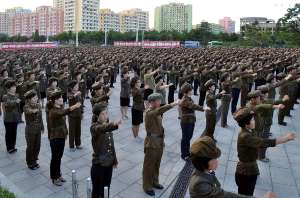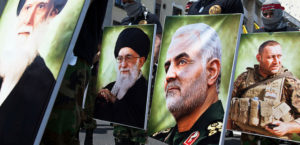The United States layered a new round of sanctions on North Korea Thursday, blacklisting individuals and organizations involved in security and forced labor policies for “ongoing and serious human rights abuses.”
Amid the ongoing standoff over Pyongyang’s threatening nuclear posture towards Japan and the United States, the U.S. Treasury sought to boost pressure by placing the financial restrictions on seven senior officials and three state units.
The move came as the State Department released its “Report on Serious Human Rights Abuses and Censorship in North Korea,” which details allegations of a national forced labor system and the government’s confiscation of the wages of North Koreans sent abroad as contract labor.
“Human rights abuses by DPRK regime remain among the worst in the world, including those involving extrajudicial killings, forced labor, torture, prolonged arbitrary detention, as well as rape, forced abortions, and other sexual violence inside the country,” State Department spokeswoman Heather Nauert said.
“Many of the country’s human rights abuses underwrite the regime’s weapons program,” she added.
The sanctions included the Military Security Command and its director and deputy director, described as “the military’s secret police” that investigates political crimes in the armed forces.
Also targeted were Minister of Labor Jong Yong Su, the External Construction Bureau and the Ch’olhyo’n Overseas Construction Company, for their roles in forced labor and foreign labor contracting deals.
The rights report details the country’s programs for sending Korean workers abroad for jobs under conditions it compared with slavery in order to reap foreign exchange for the state.
It says the Ch’olhyo’n Overseas Construction Company, working in Algeria, had Korean government security officials working with it to withhold the salaries and passports of the Korean workers, and to strictly limit their movements.
“Thousands of North Koreans are sent abroad every year to work in slave-like conditions, earning revenue for the regime,” Nauert said.




